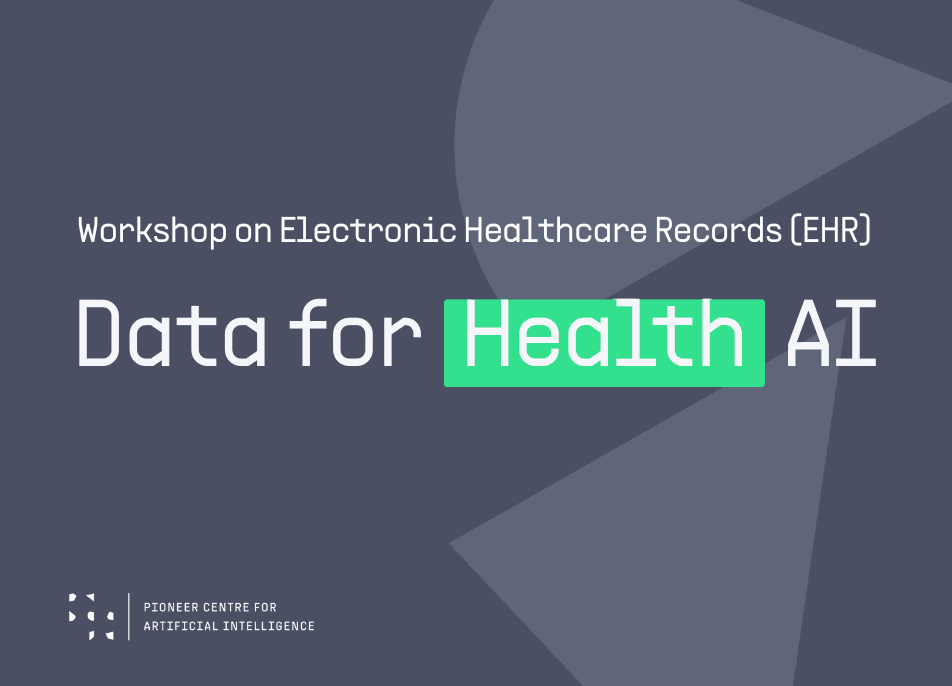Event
Workshop on Electronic Healthcare Records (EHR)

Location
Date
Type
Organizer
About
This workshop brings together researchers to advance the development and evaluation of AI models using Electronic Health Records (EHR). It focuses on strengthening collaboration across diverse EHR datasets, with particular attention to integrating Danish EHR data into the international research landscape. The workshop addresses core challenges in EHR-based modeling, including data privacy, inconsistent task definitions, and limited opportunities for data sharing. A central feature will be presentations from the MEDS collaboration, which is developing a decentralized evaluation framework that enables cross-institutional benchmarking without exposing sensitive data. Additional speakers from other research groups will present their work on EHR-based AI models, highlighting practical use cases and underscoring the growing importance of these models in clinical and research settings.
Program
12.00-12.45 Lunch
12.45-14.40 Talks
14.40-15.10 Break
15.10-17.00 Talks
17.00-18.00 Snacks at P1
18.00 Dinner
The program will be updated with further datails.
Talk 1
Speaker
Matthew McDermott, Assistant Professor, Department of Biomedical Informatics, Columbia University
Title
Realizing Frictionless Reproducibility for Health AI
Abstract
Though the ML/AI in health research community has made tremendous strides over the years, this area is also plagued by a serious reproducibility crisis. In many ways, this crisis has crippled the development of models that induce meaningful inductive biases over health data and for health problems and the extent to which new technical AI solutions can demonstrate transformative capabilities specific to the health domain. With the development of the MEDS standard and open-source ecosystem, we are challenging this reality through greater proliferation of transportable algorithms, task definitions, and models. In this talk, I’ll describe the state of this growing community, illustrate demonstrations of the impact it is already having, and describe the path forward for more reproducible, meaningful AI for health research.
Talk 2
Speaker
Robin van de Water, PhD Candidate in AI in healthcare, The Hasso Plattner Institute
Title
A Continuous Alarm System Combines Clinical Data and Wearable Vital Sign Monitoring to Predict Surgical Complications
Abstract
ML solutions are often constrained by the adage that garbage in equals garbage out, which is why we see limited success in real-world applications. EHRs are primarily designed for administration purposes rather than for ML, and thus, they need more data at the right time. Clinical ASSist AND aleRt Algorithms (CASSANDRA) extends a real-time prediction system to the entire hospital stay with a focus on addressing EHR’s shortcomings with a data segmentation and modeling approach that combines pre-operative, operational, ICU, and lab-test parameters. We create a data-driven alarm system with an underlying ML model that includes high-resolution continuous vital sign measurements from a non-intrusive hybrid nursing ward. Using this unique combination of modalities, we observe improved prediction accuracy for Surgical Site Infection, Pancreatic Fistula, and Bile Leakage after visceral surgery. Early detection of these complications improves patient outcomes and reduces healthcare costs.
Talk 3
Speakers
Sune Lehmann, P1 Collaboratory Co-Lead, Networks and Graphs, and Professor at the Department of Applied Mathematics and Computer Science and Cognitive Systems, The Technical University of Denmark, and at the Copenhagen Center for Social Data Science (SODAS), University of Copenhagen
Mikkel Odgaard, P1 PhD Fellow, Department of Computer Science and the Copenhagen Center for Social Data Science (SODAS), University of Copenhagen
Title
Data-science and modeling human behavior
Abstract
This talk provides a short overview of my group’s work on understanding human behavior. I will focus on a recent strain of work that focuses on mining the rich Danish registry data through a range of approaches ranging from statistical physics, through network science, to transformer models for sequences of life-events.
Talk 4
Speaker
Martin Sillesen, Associate Professor, Department of Surgery and Transplantation, Rigshospitalet, University of Copenhagen
Title
Clinical use of AI EHR models in the surgical setting – current use and future directions
Abstract
Martin Sillesen is a practicing surgeon at the Copenhagen Univ. Hospital, Rigshospitalet, and group leader of the Center for Surgical Translational AI Research (CSTAR) group. CSTARs focus is on developing and testing AI model approaches for translational use in the clinical setting. The presentation will focus on how we currently use clinical AI models in the surgical setting, including a discussion on the challenges and future potential directions. We will specifically focus on how use cases such as cancer and acute/trauma surgical use cases differ, including how this reflects back on the AI requirements.
Registration for this event has closed.